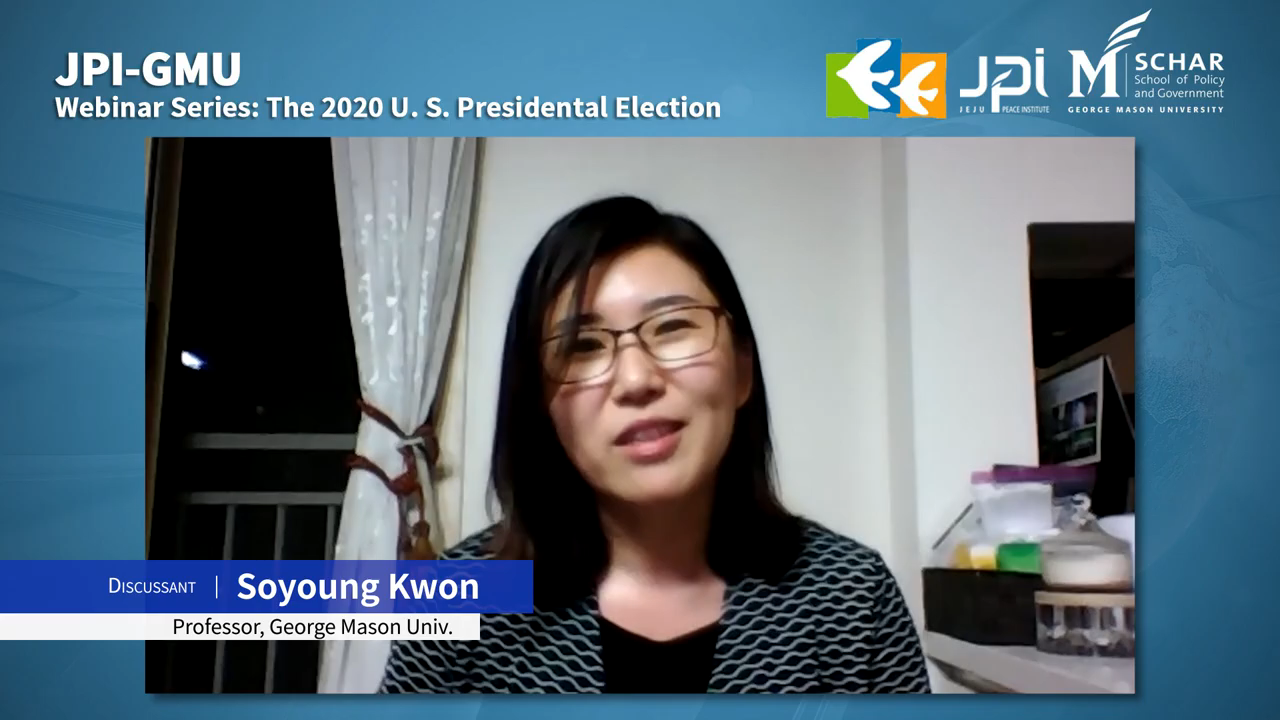Review of [JPI Online Conferences] 2020 US Presidential Election
Video Link: https://youtu.be/tyropZiKQp0?t=4038
On August 25, 2020, Dr. Soyoung Kwon, the director of the Center for Security Policy Studies- Korea participated as a discussant for the Jeju Peace Institute’s (JPI) and the Schar School of Policy and Government at George Mason University’s online conference series “Webinar series: The 2020 U.S. Presidential Election”.
The main point of Director Kwon’s talk was “why do we Asians and the rest of the world care about the domestic issue of the 2020 U.S Presidential Election?”. She stresses, since the United States is currently the most influential and dominant nation in the world, the United States’ political decision can change the global world order. After the 2020 U.S. Presidential Election, according to the election results, foreign nations will have to recreate their foreign policies on strategies to approach the U.S.
After President Trump walked into the White House in 2017, the global world order changed tremendously. Many nations in the west and the allies were bewildered with Trump’s new approach to politics and foreign relations as Trump “thinks and acts beyond the conventional framework of political diplomacy and foreign relations.” The most recent action is Trump’s Huawei ban in the United States until May 2021 due to “national security concerns.” In the United States, a nation actively promoting free trade, it is quite surprising for the president to completely ban the purchase of a foreign product.
Dr. Kwon further pointed out that Trump posts tweets significantly more than the official press release. No president has approached the public through these many SNS tweets and some of those tweets were unprofessional and impolite. These unpredictable actions of Trump make it tricky for nations in the west and the Asian allies to build up trust and credibility with the U.S.
On the other hand, Russia, China, North Korea, and some other European countries seem to hope to see Trump continuing his presidency because “they might prefer the devil you know than the devil you don’t.” If Joe Biden wins the election in November 2020, it means that these countries must come up with new foreign policies to talk and make deals with the new president who will have a different opinion. This is especially the case for North Korea.
North Korea might have to start the discussion all over again. In contrast, if Trump gets re-elected North Korea might want to push for the unfinished business that they have been conducting. Dr. Kwon raised her own concern regarding North Korea by mentioning John Bolton’s book The Room Where It Happened which revealed that Trump never had serious intent in making a deal with North Korea but was rather more concerned about his publicity than the outcome of the deal with North Korea.
Based on Dr. Kwon’s Asian perspective of the 2020 U.S Presidential Election, it is predictable that if Trump gets re-elected there will be more pressure on top of the already added economic pressure on Asian allies since Trump’s first election. Nations such as Korea and Japan will be pressured to shoulder more of the already increased security costs to support the share of expenses spent on the U.S. Army stationed in Korea and Japan. According to the Pew research center, constant pressure on Asian allies by President Trump led to a 29% drop in confidence in Trump in South Korea and an 11% drop in Japan from 2019 to 2020 and these numbers will worsen if Trump continues his presidency. China will suffer more from tariffs and the economic trade war that President Trump is actively involved in and concerned about. In return, the United States will have fewer finances spent to support ally Asian nations which can be directed to spend on domestic developments. If Trump’s presidency continues there can be some positive effects for the United States, but it can potentially break the relationship with Asian allies and worsen the already failing relationship with China. The negative outcomes outweigh the positive outcomes of President Trump’s policies.
At the same time, Biden’s election is not a guarantee to the allied Asian nations with promised benefits from the United States. However, Biden seems like a better choice than Trump. The implication has that Biden can bring positive changes for the international community by playing a part of a supportive global leader. Allied Asian nations might prefer Biden to Trump with the hope of restoring and cooperating with the Asians to bring economic and political stability in Asia. Both candidates have parallel plans to apply pressure on China. But the viewpoints on foreign policy are contrasting from one another. Trump wants to dominate his rivals through the “American First” policy while Biden hopes to restore foreign partnerships with ally democratic nations to work together to win the competition against China. For now, it seems like Asian nations may wish to see Biden be elected than to deal with the unpredictable President Trump.
Su A Cho is a sophomore majoring in Global Affairs with a concentration in Global Governance at George Mason University Campus. He is currently serving as a research assistant at the Center for Security Policy Studies – Korea. His research interest focuses on international security policies in Southeast Asia and East Asia, human security in developing nations, and democratization of Myanmar.
Photo can he found here




